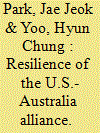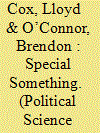| Srl | Item |
| 1 |
ID:
191827


|
|
|
|
|
| Summary/Abstract |
The AUKUS agreement to facilitate Australia's acquisition of nuclear-powered submarines has been described by its critics as a ‘bet' on the U.S. This bet entails serious risks for Australia. These risks include uncertainty around construction of the submarines; uncertainty around the U.S.'s long-term commitment to the region; and uncertainty about the future political trajectory of the U.S. These risks are compounded by the sovereignty-constraining implications of AUKUS. The reliance on U.S. technical expertise, and the demands of military interoperability, will bind Australian defence policy more closely to the U.S. than ever. Hence, AUKUS is a deal that demands close scrutiny. This article contributes to such scrutiny, exploring the risks associated with this bet on the U.S. In particular, it examines the ‘America’ that Australian governments expressly want – a liberal internationalist America with a strong commitment to democracy – and then contrasts this with the America that Australia does not want but may well get: an illiberal America that is increasingly anti-democratic at home and crudely transactional, protectionist and undiplomatic abroad. The obvious problem with this approach, we argue, is that Australia does not get to choose the presidential administration in the U.S. over the next twenty to forty years.
|
|
|
|
|
|
|
|
|
|
|
|
|
|
|
|
| 2 |
ID:
142085


|
|
|
|
|
| Summary/Abstract |
Despite potentially significant differences between an American superpower’s and an Australian middle power’s global and regional interests and strategies, the U.S.- Australia alliance has remained resilient. Moreover, Australia has recently been very cooperative with the U.S. deployment of its military assets on Australian soil. What lies behind this intriguing set of circumstances in alliance relations? To address this question, this article begins by providing a historical overview to show that the U.S.- Australia alliance is resilient despite the lack of a mutually perceived threat. Then, this article criticizes the argument that the U.S.-Australia alliance continues because it is insurance against potential military threats, especially against potential Chinese threats. First, the likelihood of a “fundamental” attack on the Australian homeland is very slim. Moreover, the ANZUS accord lacks a formal mechanism that triggers an automatic U.S. involvement in the way that NATO’s Article Five mandates such a U.S. response in Europe. Second, currently the American and Australian threat perceptions regarding China vary. Canberra entertains less fear of a “rising China” than does Washington. Instead, this article provides order-centric rationales for retaining and strengthening the U.S.-Australia alliance, and in that context it analyzes the recent development of the alliance’s military aspects, including the deployment of U.S. Marines in Darwin on a rotational basis.
|
|
|
|
|
|
|
|
|
|
|
|
|
|
|
|
| 3 |
ID:
174669


|
|
|
|
|
| Summary/Abstract |
LLOYD COX and BRENDON O’CONNOR challenge the common realist assumption that emotions are irrelevant for understanding inter-state relations. They examine the notion of special relationships in international politics. They develop a distinctive approach to the collectivization of emotions within and between states and apply this to the U.S.-Australia
special relationship.
|
|
|
|
|
|
|
|
|
|
|
|
|
|
|
|